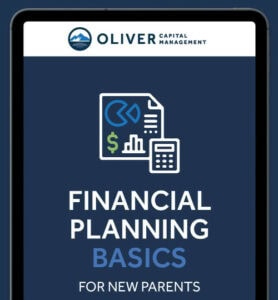In the whirlwind of parenthood, getting organized with your finances might feel like an insurmountable task. All of a sudden, your world revolves around this tiny human, and your new responsibilities can feel overwhelming. Prioritizing someone other than yourself, perhaps for the first time, is a monumental shift for many new parents – especially because this person can’t help themselves.
Amidst the chaos of countless diapers, long nights, and endless feedings, it’s easy to put off your other responsibilities. After all, you barely have time to sleep, let alone time to budget. Many new parents find themselves putting off financial planning. Parenthood teaches us swiftly that there’s much beyond our control. But there’s one thing new parents can manage: their finances. By taking charge of your financial plans early on, new parents can mitigate stress and uncertainty in the long run. Here’s how to get started.
Sit Down and Get Organized
The first step to managing your finances starts with a thorough assessment of your day-to-day life. Understanding where you stand now can help you better plan for a successful financial future.
Consolidate Accounts
Do you and your partner have assets across different financial institutions? Do you know the passwords for each account? The upcoming birth of a child is a great opportunity to merge finances and consolidate. Down the line, it makes managing money much easier.
When you’re managing late-night feedings and sleep deprivation, the last thing you and your partner will want to tackle is finding that one pesky password for your investment account. Once you have your financial accounts in line, it’s time to assess whether they will be suitable for your future goals.
Integrate Assets in One Place
Several key financial platforms can integrate your assets and liabilities in one place. Many new parents have one person handling the money in the relationship – while the other is in the dark. Having all your financial accounts in one place ensures transparency, so everyone remains aligned on the family’s financial well-being.
Make a Realistic Budget
Prior to kids, most couples may have a loose budget. If you’re building a budgethttps://bettermoneyhabits.bankofamerica.com/en/saving-budgeting/creating-a-budget for the first time, it’s important to ensure it’s a realistic spending budget. Here are some easy tips to build your budget.
Evaluate Your Current Household Income
Children aren’t cheap! Before having your first child, evaluate your current household income. Do you and your partner have consistent income? Does it vary, and if so, when? Are there times of year when you see an increase or decrease in income? All these questions will help ensure your budget reflects the time of year.

Evaluate Money Coming In and Out
Where does your money go each month? Consider childcare, rent and/or mortgage, diapers, car expenses, clothing, preschool, and other childcare. These costs can add up quickly, and it’s important to take into account all of them when planning a budget.
Be Honest
Last but not least, be honest with yourself. If your numbers don’t add up, think about where you can reduce costs.
Map Out Goals
Saving money isn’t always easy, but with time and discipline, you’d be surprised how much your savings can grow. Consider these tips:
- Think about your personal and professional goals for the future.
- Build a timeline – and understand what you’re willing to sacrifice for your goals.
- Set up an automatic savings plan. When funds are transferred directly to your savings or investment account on a regular basis, you’re less likely to touch it.
If savings feels a bit boring, why not try renaming your accounts? Instead of “Savings Account,” try: Beach House or Family Trip to Italy. This renaming makes the savings feel so much more real.
Plan for Retirement
No matter your financial situation, it’s critical to keep saving for retirement. Many new parents opt to prioritize saving for their kids’ college education. However, it’s simple to borrow money for a college education if needed – but there is no way to take out a “retirement loan.” Here are simple tips to help save for retirement.
401k Matches
If your company offers a 401k match, contribute enough to earn the match. This is essentially free money – and you can’t backtrack to pick up lost money.
Roth 401k Options
Some organizations offer a Roth 401k option, a great option for retirement savings. This avoids kicking taxes on your income down the road. Consider a tax-diversified retirement savings strategy. A 401k or IRA is called a ‘retirement plan’, not a ‘tax-deduction plan,’ for a reason.
Self Employed Options
If you’re self-employed, consider contributing the $7,000 maximum to individual retirement savings, like a Roth IRA account. A SEP IRA can also provide additional retirement funding options. The latter can be tricky, so consult a CPA or financial professional for pros and cons to each plan

Life Insurance Matters
When most new parents consider their financial future, they immediately think about college savings or retirement savings. Protecting your paycheck against the premature death or disability of a wage earner is often neglected. Your ability to earn an income is one of your biggest assets. One example: a 30-year-old earning $100,000 annually will make approximately $3.5 million over the course of their career. That’s worth insuring!
How Much Life Insurance Do You Need?
Life insurance calculations can be simple: Want – Have = Need.
Want covers three primary things: debt (mortgages, primarily), education costs, and income replacement.
Once you have this number, subtract what you have in assets and other insurance programs. This will give you a rough number for how much coverage your family may need in the event of a premature death.
Types of Life Insurance
Life insurance can be broken down into temporary and permanent coverage.
Temporary, or “Term Insurance,” lasts for a specific period of time. Generally, this period of time is 10, 20 or 30 years. Permanent plans have many advantages for young families – especially those without large savings. Term is generally the most affordable and may make the most sense.
College Education Planning
Many new parents have strong views on college education – and how to fund it. Parents tend to fall into two categories: they have a significant amount of college-related debt and don’t want their kids to take on debt, or they want their kids to take loans and learn responsibility.
If you lean towards the former, there are a number of options that may work for you, including the 529 savings plan. The 529 plan is a way to save for college expenses with considerable tax benefits. Parents can retain ownership and use the money towards the education of a second child, if the first gets a scholarship or opts to skip college.
If none of your kids end up with qualified educational expenses, you can still use the money – you’ll need to pay tax and a 10% penalty on the gains.

Find a Trusted Partner
No matter the time of your life, it’s critical to review your finances on a regular basis – at least every six months. Think of it like another seasonal check-up, like seeing your dentist or doctor. Dedicating a time every month, or every couple of months, can have a dramatic impact on your financial health in the long term.
Not sure where to start? Book a call with Oliver Capital and you’ll be on your way to a more secure and abundant future.
For Educational Purposes Only – Not to be relied upon as financial, tax, or legal advice.
6496994RG_Mar26
